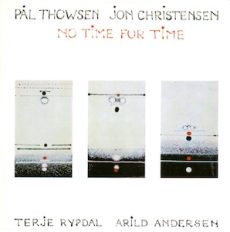
Daily Dose Of Jazz…
Jon Ivar Christensen was born March 20, 1943 in Oslo, Norway. In the late 1960s he played alongside Jan Garbarek on several recordings by the composer George Russell. He also was a central participant in the jazz band Masqualero, with Arild Andersen, and they reappeared in 2003 for his 60th anniversary.
He appears on many recordings on the ECM label with such artists as Keith Jarrett, Jan Garbarek, Terje Rypdal, Bobo Stenson, Eberhard Weber, Ralph Towner, including the seminal 1975 Solstice, Barre Phillips, Arild Andersen, Enrico Rava, John Abercrombie, Michael Mantler, Miroslav Vitous, Rainer Brüninghaus, Charles Lloyd, Dino Saluzzi Jakob Bro, and Tomasz Stanko.
Christensen was a member of the Keith Jarrett “European Quartet” of the 1970s, along with Jan Garbarek and Palle Danielsson, which produced five jazz recordings on ECM Records.
Drummer Jon Christensen died on February 18, 2020, at the age of 76 in his hometown.
More Posts: drums,history,instrumental,jazz,music

Jazz Poems
MAY 12
From The Daily Mirror
A book could be written on the moment swing turned into bop the moment Lester Young, Roy Eldridge, and Teddy Wilson gave way to Bird, Dizzy, Miles, Bud and Monk in fact it would be a great movie at least the sound track would be “beyond category” as Duke Ellington would have put it the life of a jazz musician (about which I know so little) is the life for me I felt on the afternoon Jamie and I visited his father who sat at the piano and talked and played I was tongue-tied and wanted him to play a song as if Helen Merrill were there and her voice and his fingers were about to have an intimate talkDAVID LEHMAN | 1948
from Jazz Poems ~ Selected and Edited by Kevin Young
More Posts: book,classic,collectible,history,jazz,library,poet

Daily Dose Of Jazz…
Charles E. Clark was born on March 11, 1945, in Chicago, Illinois and studied bass with Wilbur Ware. He embarked on a professional career in 1963 and went on to play with Muhal Richard Abrams in his Experimental Band between 1966 and 1968, recording with the ensemble on the album Levels and Degrees of Light.
He was a founding member of the Association for the Advancement of Creative Musicians. Clark played live with Joseph Jarman in the late 1960s, sometimes employing percussion, koto, and cello as well as bass. He recorded on Jarman’s Delmark Records releases, Song For in 1966 and again on As If It Were the Seasons in 1968.
With the death of Clark and pianist Christopher Gaddy, Jarman disbanded his ensemble and joined the Art Ensemble of Chicago.
Double-bassist Charles Clark, who during his extremely short career never recorded as a leader, died April 15, 1969 in Chicago.
More Posts: bass,history,instrumental,jazz,music

Daily Dose Of Jazz…
Mayuto Correa was born March 9, 1943 in São Gonçalo, Rio de Janeiro, Brazil and began playing in local bands from the age of twelve when he became a member of the big band Rapazes da Alvorada. At age 16 he formed the ensemble Samba Show with musicians from Niterói and made several recordings for the CBS label with them.
In the 1960s Correa was the artistic director of Pontifical Catholic University of Rio de Janeiro where he wrote and directed several plays. During this time, he also made several recordings in Brazil and worked as the musical director for the shows of Maria Bethânia, Elza Soares, and Eliana Pittman as well as playing in Roberto Carlos’s ensemble RC-7 and performing in Chacrinha’s television shows.
Leaving Brazil for Mexico in 1969 he worked with the Brazilian bossa nova group Tamba 4 before moving to the United States. Establishing himself as a musician in Los Angeles, California in the early 1970s, Mayuto became a vital session player in hundreds of major and minor albums taped in the city by 1977.
Some of the artists he recorded with are Howard Roberts, Charles Lloyd, Nat Adderley, Cannonball Adderley, Cal Tjader, Miriam Makeba, Gábor Szabó, Gato Barbieri, Kenny Burrell, Moacir Santos, Donald Byrd, Henry Mancini, Jon Lucien, Freddie Hubbard, and Richard “Groove” Holmes, among numerous others.
During that period he toured with many of the artists and became the record producer for the Argentine group Arco Iris. He returned to Brazil in 1972 when he toured with Carlos Santana and again in 1979 when he appeared on the Rede Globo television show Sexta Super.
Among his compositions is the soundtrack for the 1979 documentary Homeboys depicting Chicano youth gang culture in East Los Angeles, California. In the later years of his career, Correa performed with his bands Mayuto & Genuises 2000, Mayuto & The Dream Team Big Band, and Mayuto & Samba Pack.
Mayuto Correa continues to perform, record and tour.
More Posts: bandleader,composer,guitar,history,instrumental,jazz,music,percussion

Daily Dose Of Jazz…
Dom Minasi was born on March 6, 1943 in New York City, New York and was primarily self-taught, a natural musician. In his youth he backed singers and played his share of rock and roll, church dances and small jazz combo gigs beginning when he was fifteen.
While launching his professional career at a young age with Blue Note Records he took on numerous private students. In the mid-1970s, however, Blue Note was being sold and Minasi dropped out of the recording scene and over the next fifteen years he began freelancing, going back to school and occasionally performing with Dennis Moorman.
1993 saw Dom doing off-Broadway shows, writing hundreds of compositions and working with youth in the New York public school system. While doing all this he wrote several books on music disciplines, improvisation, theory and chord substitutions.
By the turn of the century he returned to producing compact discs for his independent label. He would go on to collaborate with a host of musicians and his improvisational excursions opened up a new audience.
Guitarist, composer, and music producer Dom Minasi, who recorded thirteen albums as a leader, died on August 1, 2023, at the age of 80.
More Posts: bandleader,composer,guitar,history,instrumental,jazz,music,producer



